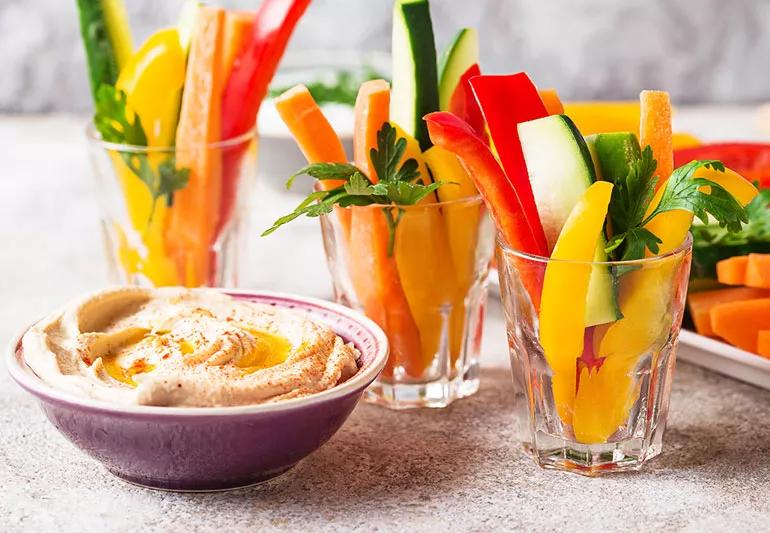Each healthy snack is less than 175 calories

Image content: This image is available to view online.
View image online (https://assets.clevelandclinic.org/transform/9d2ba319-f799-4a34-81bc-db6a6ebe1991/7healthySnacksHummus-1132328237-770x553_jpg)
A healthy snack of hummus and raw vegetables
High-quality protein packs a real punch when it comes to your health. Adding more protein to your diet could even decrease your risk of heart disease and stroke. And some research suggests that a little extra protein might make you feel fuller so you can get through the day.
Advertisement
Cleveland Clinic is a non-profit academic medical center. Advertising on our site helps support our mission. We do not endorse non-Cleveland Clinic products or services. Policy
While our on-the-go lifestyle makes it difficult to choose healthy protein-rich foods (chocolate-covered peanut butter cups don’t count, sadly), high-protein snacks are within reach. Registered dietitian Anna Taylor, MS, RD, LD, CDE, lists her top seven snacks that are good sources of protein. And no, “protein bars” didn’t make the cut.
“Most people do well with three meals and one to two snacks per day, depending on activity levels and calorie needs,” says Taylor. “Someone very active might need an additional snack, while someone less active or petite will need fewer snacks.”
Taylor warns that snack calories add up quickly: Eating 200 calories a day beyond what your body burns will mean 20 pounds of weight gain a year. “If the snack you’re eating has more than 200 calories, it’s actually a mini-meal. And if it doesn’t have fiber or protein, it’s probably not nutritious.”
The following protein-packed snacks are between 150 and 170 calories and contain no more than 20 grams of carbohydrates:
“Try one-fourth cup of lightly salted, dried edamame or dried chickpeas. These options are great for people who have nut allergies and are craving something crunchy,” says Taylor. Or reach for unsalted nuts — 22 roasted, unsalted almonds make a high-protein snack, delivering between 6 to 15 grams of protein.
Advertisement
You’ll get more than 20 grams of protein when you reach for a small container (around two-thirds cup) of fat-free Greek yogurt. Try it with fresh or frozen berries. Another option: Turn your yogurt into a smoothie by adding berries and some unsweetened almond milk.
To one-half cup of cottage cheese, add one-half cup of fruit like pineapple or peaches. You can even choose fruit canned in juice, then drain it. You’ll take in more than 10 grams of protein.
“This works out beautifully and looks like a mini-meal, but it’s not: It’s a garden salad with one-fourth cup of beans, a hard-boiled egg and a tablespoon of light dressing,” says Taylor. “In addition to fiber, you’ll get between 8 and 10 grams of protein.”
Add 1 teaspoon of low-fat mayonnaise to a quarter cup of drained canned tuna. Add diced celery, carrots or onion for flavor. Spoon the tuna on four woven whole-wheat crackers for a snack that gives you more than 10 grams of protein.
One-quarter cup of hummus delivers 5 grams of protein and 4 grams of dietary fiber. Use it as a dip for 1 cup of raw vegetables.
“I love this one: Toast one-half of a whole-wheat English muffin. Cook four egg whites (about one-half cup) and place on the muffin. Add 1 tablespoon of shredded cheese,” says Taylor. “This healthy snack has fiber and close to 15 grams of protein, plus it’s very filling.”
Advertisement

Sign up for our Health Essentials emails for expert guidance on nutrition, fitness, sleep, skin care and more.
Learn more about our editorial process.
Advertisement
The tropical fruit is a good source of antioxidants and vitamin C
High amounts of cholesterol and saturated fat in red meat may be linked to heart disease
The leaves and pods from this tree are rich in essential nutrients
This starchy root vegetable is a staple in many global cuisines — but it has to be prepared correctly, or it can cause serious concerns
These delicate green sprouts can give you an extra dose of vitamin K and other nutrients — but they’re not safe for everyone
Edamame, lentils and chicken breast are good sources of protein
Eating this root vegetable can help support your eye, heart and brain health
The flavorful herb is full of antioxidants that may help regulate blood sugar
Although it could be used as a moisturizer, this new trend is not recommended
Communicating clear limits helps protect your time, energy and emotional well-being
High cholesterol can be genetic, but testing and treatment can lower your heart disease risk